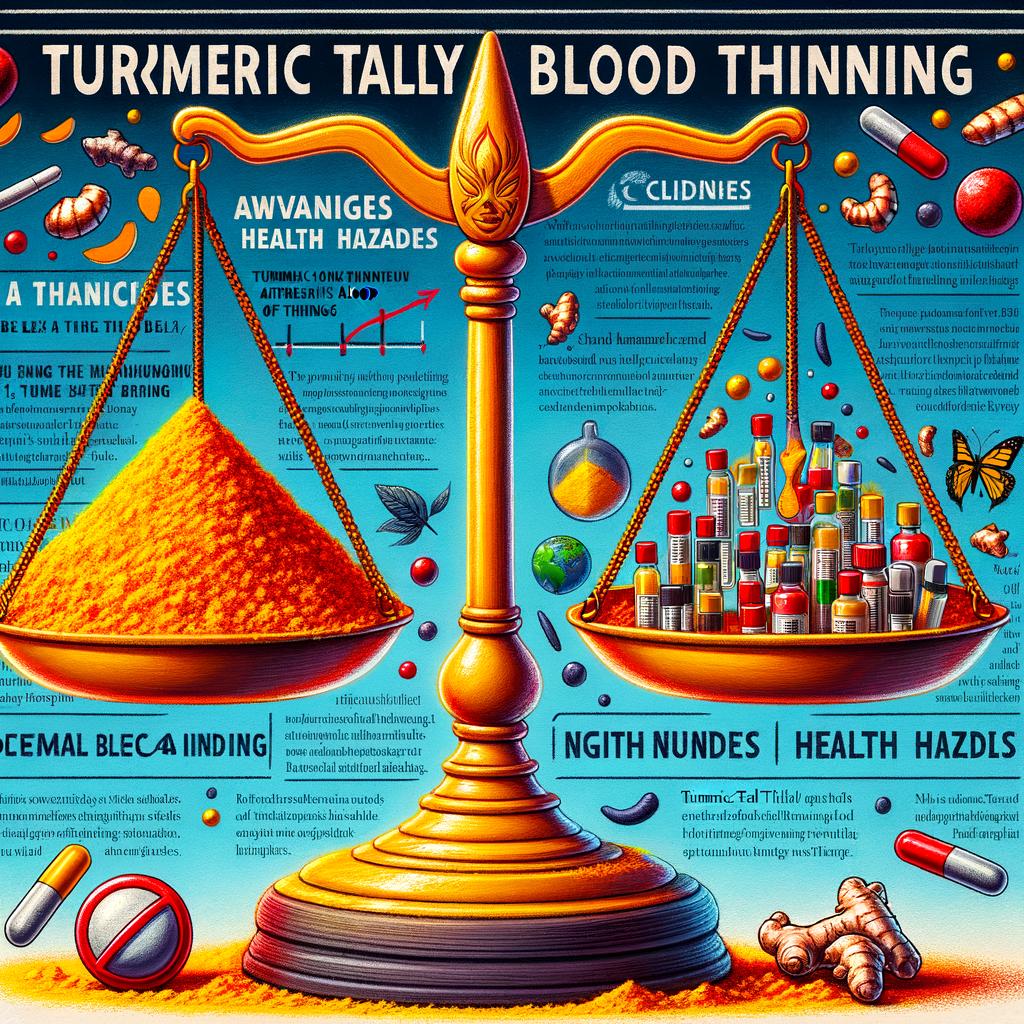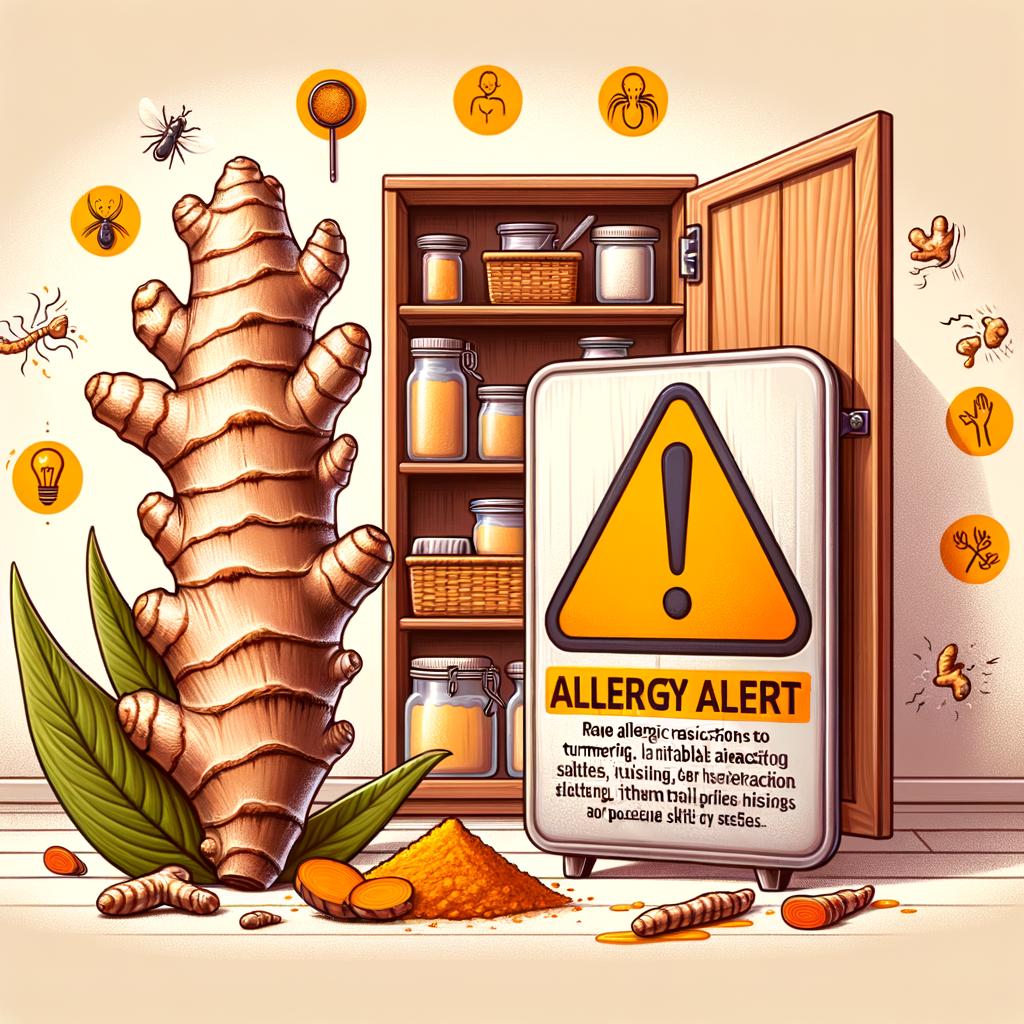Welcome to our colorful exploration of the remarkable spice, turmeric. This golden gem, renowned for its vibrant hue and extensive health benefits, has taken the dietary supplement world by storm. Yet as is true with most potent ingredients, the story of turmeric comes with certain unexpected twists. From its powerful active compound Kirin to alarming side effects when misused, our discussion aims to arm you with the knowledge necessary to use this intriguing spice safely and effectively. So, fasten your seatbelt as we traverse the intriguing course of turmeric’s less-discussed aspects and debunk the misconceptions surrounding this golden wonder!
Table of Contents
- Unmasking the Potency of Turmeric: From Health Benefits to Hidden Perils
- In the Weeds of Digestive Distress: Understanding Turmeric’s Gastrointestinal Impact
- Treading Lightly with Turmeric: The Link Between Oxalates and Kidney Stones
- Turmeric Tally: Weighing the Advantages and Pitfalls of its Blood Thinning Properties
- Allergy Alert: Unveiling Rare but Possible Allergic Reactions to Turmeric
- Turmeric and Iron Absorption: A Challenging Confluence.
- Q&A
- Insights and Conclusions
Unmasking the Potency of Turmeric: From Health Benefits to Hidden Perils

Despite being celebrated for its vibrant hue and numerous health benefits, Turmeric is not without potential pitfalls. As a potent ingredient, it does possess unknown side effects, which we’ll delve into, revealing the often-unmentioned perils of incorporating this spice into your dietary routine. The active compound responsible for its anti-inflammatory and antioxidant properties, Curcumin, is a double-edged sword. While promising health benefits, it can also trigger undesirable effects, especially when consumed unstintingly.
- Gastrointestinal distress: Some individuals may encounter bloating, gas, or stomach cramps, attributed to turmeric’s ability to stimulate bile production and increase gastric acid secretion.
- Risk of kidney stones: Turmeric contains oxalates, compounds contributing to kidney stone formation. Hence, individuals predisposed to developing kidney stones should tread carefully.
- Blood-thinning properties: Beneficial for cardiovascular health, these properties might pose risks for those already using blood-thinning medications.
- Allergic reactions: Although rare, turmeric’s consumption can lead to mild skin irritation to more severe reactions like difficulty in breathing.
- Iron absorption interference: Turmeric contains polyphenols, hindering absorption of non-heme iron from plant sources.
Owing to these side effects, individuals should consider introducing turmeric gradually into their diets and monitor their body’s response. It’s crucial for people consuming blood-thinning medications to engage their healthcare providers before using turmeric. Similarly, if you suspect an allergy to turmeric, seeking immediate medical attention is imperative.
| Potential Side Effect | Tips to Avoid |
|---|---|
| Gastrointestinal Distress | Gradual introduction of turmeric into the diet |
| Risk of Kidney Stones | Maintaining proper hydration |
| Blood-thinning | Consultation with healthcare provider before use |
| Allergic Reactions | Immediate medical attention and consultation with an allergist |
| Iron Absorption Interference | Consume turmeric at separate times from iron-rich meals |
In the Weeds of Digestive Distress: Understanding Turmeric’s Gastrointestinal Impact

Kirin, the active component in turmeric that’s praised for its medicinal properties, is primarily responsible for the spice’s anti-inflammatory and antioxidant effects. However, its potency may lead to side effects when consumed in large quantities or over extended periods. One of the most common side effects reported is gastrointestinal distress. Symptoms like bloating, gas, and stomach cramps can be associated with turmeric use due to its ability to stimulate bile production leading to increased gastric acid secretion. If you have a history of digestive issues, it’s advisable to introduce turmeric slowly into your diet and carefully observe your body’s response.
If you have a history of kidney stones or predisposition towards them, approach turmeric with caution. Turmeric contains oxalates, compounds that can play a role in the formation of kidney stones. If you are susceptible to kidney stones, you may need to limit your turmeric intake to mitigate this risk. The risk of formation of stones can be reduced by maintaining proper hydration. Turmeric also has natural blood-thinning properties, which, while beneficial for cardiovascular health, can pose risks for those already on blood-thinning medications. Consuming high amounts of turmeric, particularly in supplement form, can potentially amplify the risk of bleeding or interfere with anticoagulant medications.
| Condition | Suggested Consumption |
| Gastrointestinal Distress | Gradual introduction into diet |
| Kidney Stones | Limited intake with proper hydration |
| Blood Thinning | Consult healthcare provider if on medication |
Allergic reactions to turmeric, while rare, have been reported. These can range from mild skin irritations to more severe symptoms such as difficulty breathing and swelling. If you suspect you’re allergic to turmeric, seek medical attention promptly. Turmeric contains polyphenols, compounds that can inhibit the absorption of non-heme iron, which is found in plant sources. If your iron intake is primarily from plant-based sources, excessive consumption of turmeric may affect your iron levels. As a solution, consider consuming turmeric at different times from iron-rich meals.
Treading Lightly with Turmeric: The Link Between Oxalates and Kidney Stones

Nestled amidst a plethora of warming spices, turmeric is celebrated for its deeply hued vibrancy and laudable medicinal properties. As the spice soars in popularity, it’s essential to unmask the truth about potential side effects, making space for mindful choices. The active compound, Kirkin is responsible for much of its anti-inflammatory and antioxidant effects. Its potency, whilst healthful, can surface side effects if consumed excessively or over prolonged periods.
Commonly reported reactions include gastrointestinal distress, symptoms of which may manifest as bloating, gas, and stomach cramps. Worthy of careful attention is the risk associated with developing kidney stones, as turmeric harbours oxalate compounds that enhance their formation.
- Hydration: Staying well hydrated can help mitigate the risk of kidney stone formation.
- Interactions: Turmeric exhibits natural blood-thinning qualities that might elevate bleeding risks or interact adversely with anticoagulant medications.
- Allergic reactions: Though relatively rare, some individuals could develop allergies to turmeric, triggering mild skin irritation to severe reactions.
- Iron Absorption: Turmeric is rich in polyphenols which can negatively impact the absorption of iron from plant-based sources in your body.
Meticulously woven into these chapters of potential discomforts is the potent reminder of the need for content moderation and considered incorporation of this golden spice into daily diet regimens. It is absolutely paramount to consult with healthcare providers if one is on blood-thinning medications or suspect a potential allergic reaction to the spice.
Turmeric Tally: Weighing the Advantages and Pitfalls of its Blood Thinning Properties

Unveiling Turmeric’s Side Effects
The well-regarded turmeric, known for its brilliant hue and abundant health advantages, is not without its potential pitfalls. Rebeknown to many, turmeric harbors some side effects you must be conscious of while deciding to incorporate it into your regimen. Kirin, turmeric’s heart, is the inflammation and antioxidant effects’ primary driver. Kirin, while boasting myriad health boons, can birth an array of side effects when consumed excessively or over an extended period.
The most frequently reported turmoil in turmeric’s adopters is gastrointestinal distress. Side effects consist of bloating, gas, and stomach cramps, resulting from turmeric’s stimulating bile production prowess, leading to a gastric acid secretion surge. It’s thus judicious to progressively incorporate turmeric into your diet if you have a propensity for digestive complications, keeping a keen eye on your body’s responses.
The Unseen Powers of Turmeric
Individuals with a history or predisposition of kidney stones should approach turmeric with careful consideration, owing to its oxalate content that can fuel the formation of kidney stones. Nevertheless, staying duly hydrated can help in countering the stone forming propensity. Additionally, turmeric has inherent blood thinning properties, which can enhance cardiovascular health but also pose risks for individuals already on blood thinning drugs.
High turmeric in-take, especially in the form of supplements, can ratchet up bleeding risks or interfere with anticoagulant medications. Adults on blood thinning medications are, therefore, greatly advised to confer with their healthcare providers before including turmeric into their dietary routines. Turmeric, while rarely, can cause allergic reactions in some, varying from mild skin irks to severe breathing trouble or swelling. In the event of a potential turmeric allergy, it’s vital to promptly seek medical attention.
Plotting Turmeric’s Nutritional Aspect
Lastly, turmeric’s polyphenols can inhibit non-heme iron absorption – iron derived from plant resources. Excessive turmeric consumption might therefore negatively affect your iron levels if your diet majorly includes plant-based iron sources. To counter this, it is wise to space out the consumption of turmeric and iron inducers.
Allergy Alert: Unveiling Rare but Possible Allergic Reactions to Turmeric

With turmeric celebrated globally for its bright hue and health advantages, we can’t overlook the potential side effects associated with this potent spice. The active compound responsible for turmeric’s celebrated medicinal properties is Kirin. Despite being lauded for its potential health benefits, especially its anti-inflammatory and antioxidant effects, we must not forget that Kirin’s potency can lead to side effects, particularly when consumed in large quantities or for extended durations.
Below is a table that focuses on some of the side effects associated with turmeric that can arise when excessively consumed.
| Side Effect | Description | Precaution |
|---|---|---|
| GI Distress | Can result in bloating, gas and stomach cramps attributed to its ability to stimulate bowel production and increased gastric acid secretion. | Individuals prone to digestive problems should introduce turmeric into their diet gradually and observe their body’s reaction. |
| Risk of Kidney Stones | Turmeric contains oxalates, compounds which can contribute to the formation of kidney stones. | Those at risk of developing kidney stones should limit their intake of turmeric whilst maintaining proper hydration. |
| Blood Thinning | Turmeric has natural blood thinning properties which could pose risks for individuals already on anticoagulants. | Those on blood thinning medication should consult their healthcare provider before incorporating turmeric into their routine. |
| Allergic Reactions | Though rare, some individuals may experience allergic reactions to turmeric from mild skin irritation to severe reactions. | If a turmeric allergy is suspected, it’s important to seek immediate medical attention and consult with an allergist for appropriate dietary adjustments. |
| Iron Absorption Interference | Turmeric contains compounds known as polyphenols which can stop the body from absorbing non-heme iron, iron found in plant sources. | Excessive consumption of turmeric may impact iron levels in individuals heavily reliant on plant-based iron sources. It might be worth consuming turmeric and iron-rich foods at separate times. |
Remember, while turmeric has numerous health advantages, moderation is key. Overdoing it could yield undesirable effects, the most common being gastrointestinal distress. Individuals at risk of turmeric side effects should limit their use of the spice and consult a healthcare professional for advice on safer consumption methods and quantities.
Turmeric and Iron Absorption: A Challenging Confluence

Despite the array of health benefits attached to turmeric, excessive consumption may influence your nutritional intake, notably iron levels. In particular, turmeric fans who derive most of their iron from plant-based sources should be aware of its potential to interfere with digestion. This is all down to turmeric’s rich polyphenol compounds, which can inhibit the absorption of non-heme iron (the type expressed in plant foods) in your body. Thus, if your diet relies heavily on plant-based iron sources, overindulging in turmeric might affect your iron levels. To sidestep this effect, why not try consuming turmeric at different times from iron-rich meals? This way, you can still reap the spice’s benefits while steering clear of its side effects.
Side Effects and Precautions
Before incorporating this vibrant spice into your daily regimen, consider the potential side effects. One of the most frequently reported is gastrointestinal distress. Symptoms can include bloating, gas, and stomach cramps, owing to turmeric’s capacity to boost bile production and augment gastric acid secretion. A sensible approach would be to gradually introduce turmeric into your diet while observing your body’s response.
| Side Effect | Precautions |
|---|---|
| Gastrointestinal distress | Introduce turmeric gradually and monitor body’s response |
| Allergic Reactions | Seek medical attention and consult an allergist |
| Blood Thinning | Consult healthcare provider, especially for people on blood thinning medications |
| Kidney Stones | People prone to kidney stones should limit turmeric intake |
| Iron Absorption Interference | Consider consuming turmeric at separate times from iron-rich meals |
The risk of kidney stones should also be considered, as turmeric contains oxalates, compounds that could lead to the formation of kidney stones. People with a history of kidney stones or a predisposition to their development should tread carefully while introducing turmeric into their diets. Additionally, given turmeric’s natural blood thinning properties, individuals on blood-thinning medications should consult their healthcare provider before introducing the spice into their routine.
Q&A
Q: What is turmeric and why is it popular?
A: Turmeric is a vibrantly colored spice celebrated for its numerous health benefits and is often used as a dietary supplement. The active compound in turmeric, Kirin, is responsible for its anti-inflammatory and antioxidant effects.
Q: Are there any adverse side effects of turmeric?
A: Yes, despite its beneficial properties, turmeric can also cause certain side effects, especially when consumed in large quantities or over extended periods.
Q: What are the side effects associated with consuming excessive amounts of turmeric?
A: The side effects include gastrointestinal distress such as bloating, gas, and stomach cramps; the risk of kidney stones; blood thinning that may interact with anti-coagulant medications; potential allergic reactions, and interference with iron absorption.
Q: Can everyone consume turmeric?
A: Although turmeric is generally safe for many people, some individuals may experience adverse reactions. For example, those prone to kidney stones should approach turmeric with caution. Also, anyone on blood thinning medications should consult with their healthcare provider prior to including turmeric in their diet.
Q: How is turmeric linked to kidney stones?
A: Turmeric contains oxalates, which are compounds that can contribute to kidney stones’ formation. Those with a history of kidney stones, or a predisposition to developing them, should be mindful of their turmeric intake.
Q: How does turmeric affect iron absorption?
A: Turmeric contains compounds known as polyphenols, which can inhibit the absorption of non-em iron – iron derived from plant sources. If you rely heavily on plant-based iron sources, excessive turmeric consumption may impact your iron levels.
Q: How can one ensure they’re safely incorporating turmeric into their diet?
A: Start by introducing turmeric gradually into your diet, monitoring your body’s response. It is also advisable to stay properly hydrated and consider consuming turmeric at separate times from iron-rich meals. If you have any existing health conditions, always consult with a healthcare provider before making significant dietary changes.
Insights and Conclusions
In conclusion, while the golden spice, turmeric, is widely applauded for its potential health benefits, it is also important to be cognizant of the potential drawbacks. From gastrointestinal distress to exacerbation of kidney stone formation, restrictive blood thinning properties and even rare allergic reactions, turmeric is not without a complex facet of potential pitfalls. Also noteworthy is the spice’s interference with the absorption of non-heme iron from plant-based sources. Guiltless or guilty, there’s no verdict here. It’s a case of consuming with caution, tuning into your body’ s responses, and receptive consultation with healthcare professionals. Just like our life’s experiences teach us, every good thing does indeed come with its own set of challenges. Similarly, your favourite sunny supplement, turmeric, is no exception. Remain informed, stay knowledgeable and continue peppering your life with the spice of well-being based on educated decisions. Till next time, keep stirring the pot of healthful curiosity!

